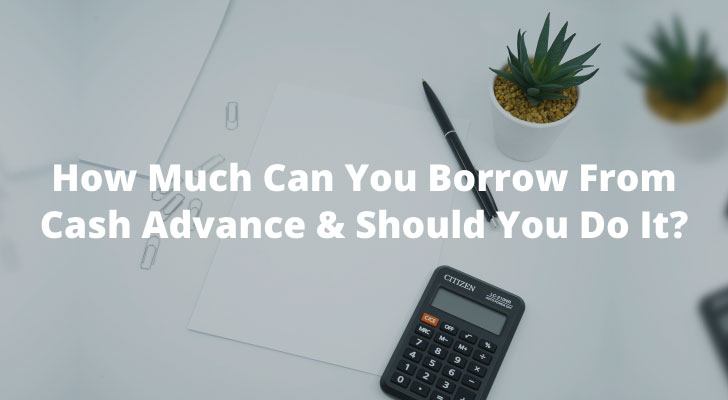When you end up absolutely needing some cash rather quickly and yet having nobody to turn to for help, or simply not wanting to bother the people around you, there is one possibility that you can consider. That possibility is called a cash advance loan, or a payday loan if you prefer that term. Read more about it.
These types of short-term loans can be rather useful for people who find themselves in emergencies, needing to cover certain expenses that they didn’t previously see coming. In short, if you are in a financial pickle, there is a quick way out and it consists of using the cash advance option. This solution has proved to be extremely helpful to a lot of people and I am sure that you have thought about using it at least once.

Did You Know?
- Average cash advance limit is 20% of your credit card limit.
- Cash advance fees typically range from 3% to 5% of the amount borrowed.
- Interest rates on cash advances can be 25% higher than regular credit card rates.
- 95% of cash advances start accruing interest immediately.
- 57% of borrowers use cash advances for emergency expenses.
What’s more, I am sure that you are thinking of using the option right now. Yet, you have a few questions that you need to have answered before you decide to set everything in motion and get your hands on the cash that you need. One of those questions is, of course, linked to the actual amount that you would be allowed to borrow this way.
Apart from the question regarding the amount of money you could borrow this way, there are probably a few more circling around your mind. For one thing, you want to know whether this is a good idea and whether you should do it in the first place. Then, you are most likely also interested in learning about the entire process, so that you can take all the right steps should you decide to do this.
Here’s what you should know about cash advances: https://www.consumer.gov/articles/1011-payday-loans-and-cash-advances
If you have all of those questions that I have mentioned above, then you have undoubtedly come to the right place. I will try and give you the clearest possible answers to those, so that you can get a better idea about how everything works in the world of cash advances. So, if you simply keep on reading, you’ll get the answers you need and thus realize if you want to get your payday loan or not.
How Much Could You Borrow?

As previously mentioned, the first question that you probably have is connected to the amount that you would be able to borrow using this option. Before I give you an approximation, I want you to remember one specific thing. These are short-term loans and they are usually given out rather quickly, as they are often used for emergencies.
This brings us to an important conclusion. Given that these are quick loans that people usually need in emergencies, it is perfectly logical that the amount they can borrow won’t be too high. After all, nobody will just give you a huge cash advance without any kind of a security that you will pay the money back as soon as possible. That’s not how things work in the world of finances and I am quite certain that you understand that already.
The fact that you can get cash advance online further goes to show that you shouldn’t expect to get a huge amount. The simplicity of the process is something that appeals to everyone, but it is also what lowers the maximum amount that can be borrowed. I believe you do get the entire logic behind that.
Did You Know?
- Only 15% of borrowers repay cash advances within the same billing cycle.
- The average cash advance amount is $300.
- 70% of cash advance users have credit card debt.
- 30% of cash advance borrowers default on repayment.
- Cash advance interest rates can reach up to 29.99% APR.
Supercharge Your AWeber Account
Take Your Email Marketing To The Next Level With These Powerful Tools
Now, the actual maximum amount can differ from lender to lender and even from state to state. It can also differ in accordance with your salary. Yet, the limit is usually set at $500, which is approximated to be enough to cover certain emergencies that might arise out of nowhere. Plus, it is the amount that you will definitely be able to repay pretty quickly, which is probably one of the reasons why it is set as a maximum. No lender wants to risk it by giving out higher amounts without any guarantees.
Is It A Good Idea?

After realizing that the amount you need is lower than, or the same as, the approximate maximum amount, you will probably conclude that a cash advance is the perfect solution to the troubles that you have found yourself in. Yet, you cannot help but wonder whether doing this is actually a good idea or not. So, let me try and give you an answer to that.
While the fact that there is no grace period here and that the interest rate starts accumulating from day one doesn’t quite speak in favor of these advances, here is the thing. This is actually the best, and possibly the only, option for people to get their hands on some quick cash that they might need for whatever particular reason. Plus, this type of a loan is completely unsecured, meaning that you don’t need to provide any collateral, which is another benefit.
There are, of course, a few more benefits that come with getting these cash advances and thus securing yourself the finances you need. Among other things, these are pretty quick to process, meaning that you won’t need to wait for a long time. Additionally, there is also the fact that you can qualify for these rather easily even if you don’t have a really great credit score. And, it is also worth mentioning that you can use the money you get for basically anything, without being limited to certain things.
Did You Know?
- The average fee for a $200 cash advance is $10 to $15.
- 43% of cash advance users use them for non-emergency expenses.
- Cash advances can negatively impact your credit score if not repaid quickly.
- Only 25% of cash advance users compare rates before borrowing.
- 55% of users regret taking a cash advance due to high costs.
Application Is Simple
There’s only one question left that you need to have answered is here. If you feel that there's no way to get yourself a cash advance because of a not-so-great credit record in the past, or your loan application was rejected by your bank some time ago, there's no point in worrying about what's happened in the past. You can always seek a good loan deal and send an application again, you have nothing to lose. The emergency expenses that you may be facing right now can always be covered.
A loan application process itself is, fortunately, quite simple and can be completed with a few clicks on your smart device. You just need to clarify your situation before you apply, so you can manage your finances after your application is approved. The things you should prepare are;
- Your basic personal information (e.g. passport, driver's license) and banking detail.
- How much you need to borrow and what for.
- How you will use the money (all at once or over some time.)
- How you will repay the loan, and whether the method/frequency/repayment amount is feasible to you.
- If you have a bad credit score, write down how it happened. You may not be asked the question, depending on the lender, but it'll always be good, moving forward, to be clear about this to maintain a good record in the future.
After providing the relevant information to the lender, all you have to do is to hope that your application will be approved swiftly. So, find and choose the best lender, complete the application and get your money in no time.
Don't Borrow Money From a Private Lender
Borrowing money from private lenders can be an option for those who are unable to obtain financing from traditional sources, such as banks or credit unions. Private lenders may include individuals or companies that specialize in lending money to borrowers, often at a higher interest rate than traditional lenders.
However, it's important to be cautious when borrowing from private lenders, as there may be risks involved. Private lenders may have less regulation and oversight than traditional lenders, and their lending terms may be less favorable to the borrower. It's important to carefully review and understand the terms of any loan agreement before signing it, including the interest rate, repayment terms, and any fees or penalties.
Additionally, some private lenders may engage in predatory lending practices, such as charging exorbitant interest rates or including hidden fees in loan agreements. Borrowers should be aware of these risks and thoroughly research any potential lenders before entering into an agreement.
In general, it's important to carefully consider all options when borrowing money, including traditional lenders, credit unions, and other reputable sources, before turning to private lenders. It's also a good idea to seek advice from a financial professional or credit counselor before making any decisions about borrowing money.
